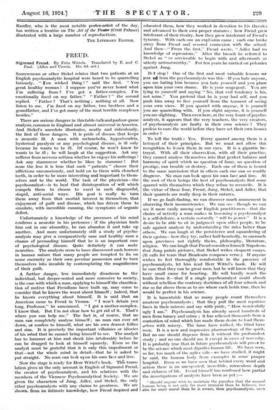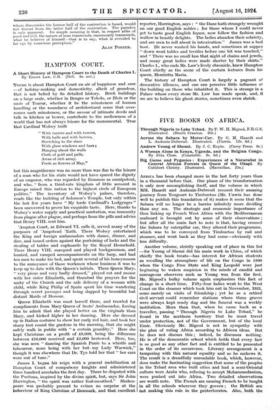FREUD.
Sigmund Freud. By Fritz Witte's. Translated by E. and C. Paul. (Allen and Unwin. 10s. 6d. net.) SOMEWHERE or other Stekel relates that two patients at an English psychoanalytic hospital were heard to be quarrelling
furiously. "You wicked thing ! " • said the first. "You great healthy woman ! I suppose you've never heard what I'm suffering from ? I've got a father-complex. I'm emotionally fixed on my father." " Father ? " the second replied. " Father ? That's nothing ; nothing at all. Now listen to me. I'm fixed on my father, two brothers and a grandfather, and I've got many of the most terrible complexes besides."
There are serious dangers in this table-talk and parlour-game analysis, common in England and almost universal in America. And Stekel's anecdote illustrates, neatly and ridiculously, the first of these dangers. It is pride of disease that keeps a neurotic ill. A man with melancholia, hypochondria, hysterical paralysis or any psychological disease, is ill only because he wants to be ill. Of course, he won't know he wants to be ill ; he will laugh at the suggestion. Ask any sufferer from nervous asthma whether he enjoys his sufferings ! Ask any stammerer whether he likes to stammer ! But none the less it is true that such " patients " choose their afflictions unconsciously, and hold on to them with clenched teeth, in order to be more interesting andinaporiant to them- selves and to the world. The task of the physician—the psychoanalyst—is to heat that disintegration of will which compels them to choose to excel in such disgraceful, stupid, anti-social ways. His goal is really to turn them away from that morbid interest in themselves, that enjoyment of guilt and disease, which has driven them to simulate, with incredible cunning, the symptoms of organic defect.
Unfortunately a knowledge of the processes of his mind confirms a neurotic in his pretences ; if the physician finds him out in one absurdity, he can abandon it and take up another. And more unfortunately still a study of psycho- analysis may give a comparatively sane and healthy man a chance of persuading himself that he is an important case of psychological disease. Quite definitely it can make neurotics. The analysts seem to have discovered such horrors in human nature that many people are tempted to fix on some enormity as their own peculiar possession and to turn themselves into invalids by contemplating the magnificence of their guilt.
A further danger, less immediately disastrous to the individual, but deeper-seated and more corrosive to society, is the ease with which a man, applying to himself the classifica- tion of motive that Freudians have built up, may come to consider that he knows the worst about 'himself; indeed, that he knows everything about himself. It is said that an American came to Freud in Vienna. "I won't detain you long, Professor," he announced. "I got a mother-complex. 1-know that. But I'm not clear how to get rid of it. That's where you can help me." The fact is, of course, that no man can completely, analyse himself ; no man can ever set down, or confess to himself, what are his own dearest follies and sins. It is precisely the important villainies or idiocies of his mind that he cannot bring himself to see. The analyst has to hammer at him and shock him intolerably before he can be dragged to look at himself squarely. Even so the analyst must be grateful that it is only this impediment or that—not the whole mind in detail—that he is asked to put straight. No man can look upon his own face and live.
Now the stage is ready for Herr VVitters book. This trans- lation gives us the only account in English of Sigmund Freud, the creator of psychoanalysis, and his relations with the members of the Viennese Psychoanalytical Society. We are given the characters of Jung, Adler, and Stekel, the only other psychoanalysts with any ...claims to greatness. We are
frbm an intimate knowledge, how Freud inspired and
educated them, how they worked in devotion to his theories and advanced to their own proper s-tatures; how Freud grew intolerant of their rivalry, how they grew intolerant of Freud's tyranny. With each one an expl3sion came ; each one broke away from Freud and severed connexion with the school. And then—" From the first," Freud wrote, "Adler had no knowledge of repressions." After the breach he referred to Stekel as "so serviceable to begin with and afterwards so utterly untrustworthy." For ten years he carried on polemics against Jung.
Bit stop ! One of the first and most valuable lessons we lear ed from the psychoanalysts was this—If you hate anyone, you are-hating him because you hate yourself and you place upon-him your own shame. He is your scapegoat. You are
to yourself and saying " No, that evil tendency is his, not mine." You pretend that he is your bad self, and you push him away to free yourself from the torment of seeing your own vices. If you quarrel with anyone, it is yourself you are quarrelling with. If you slight anyone, it is yourself you are slighting. Then even here, at the very fount of psycho- analysis, it appears that the very teachers, the very creators, of psychoanalysis are faulty in their own science ? They profess to cure the world before they have set their own houses in order ?
To tell the truth Yes. Every quarrel among them is a betrayal of their principles. But we must not allow this recognition to lessen them in our eyes. It is a gigantic be- trayal. With all their observstion, with all their practice, they cannot analyse themselves into that perfect balance and harmony of spirit which no question of fame, no question of prestige, can trouble or destroy. Each one of them is bound to the same narcissism that in others each one can so readily diagnose. No man can look upon his own face and live. At the root of their beings the best of psychoanalysts find some quarrel with themselves which they refuse to reconcile. It is the virtue of these four, Freud, Jung, Stekel, and Adler, that their quarrels are really deep in their natures.
If we go fault-finding, we can discover much amusement in observing their inconsistencies. We can sec—though we can see it more easily among our English practitioners—that the choice of activity a man makes in becoming a psychoanalyst is a self-defence, a certain cowardly "will to power." It is a desire to be able to sit in judgment upon other people, to be safe against analysis by understanding the rules better than others. We can laugh at the persistence and squandering of their egoism—how they try, rather half-heartedly, to encroach upon provinces not rightly theirs, philosophy, literature, religion. We can laugh that Freud considers himself Napoleon, that Jung paints pictures, that Stekel writes eloquent essays. (It calls for tears that Baudouin composes verse.) If anyone wishes to feel thoroughly comfortable in the presence of psychoanalysts, let him read Herr Wind's book. He will be sure that they can be great men, but he will know that they have small cause for boasting. He will hardly reach tho truth from it—that if a single psychoanalyst could absorb without rebellion the contrary doctrines of all four schools and rise so far above them as to see where each holds true, then he would be perfect in his science.
It is lamentable that so many people count themselves amateur psychoanalysts ; that they pull the most repulsive faces in their mirrors and say with pride, "How wonderfully
ugly I am." Psychoanalysis has already saved hundreds of 'men from lunacy and crime ; it has relieved thousands from a contortion of mind which has made them desire to load them- -selves with misery. The lame have walked, the blind have seen. It is a new and impressive pharmacology of the spirit.
But no one should dispense from it without the profoundest study ; and no one should use it except in cases of necessity. It is probably true that in future psychoanalysis will prove to be the science which most dignifies human life. We have seen, so far, too much of the uglier s;de—we have studied, it might be said, the human body from examples in some pauper hospital. Even so we have seen that behind every word and action there is an unexpected, incredible, miraculous depth and richness of life. Freud himself has confessed how partial the investigations of analysts have been as yet :—
"Should anyone wish to maintain the paradox that the normal human being is not only far more immoral than he believes, but also far more moral than lie is aware, then psychoanalysis, upon
whose discoveries the former half of the contention is based, would not dissent from the latter half of the contention. The paradox is only apparent. Its simple meaning is that, in respect alike of good and evil, the nature of man transcends, enormously transcends, what he believes of himself—that is to say, what is revealed to his ego by conscious perception."
ALAN PORTER.



































 Previous page
Previous page